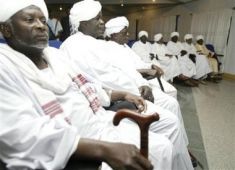Sudan’s Darfur Uneasy Peace
May 13, 2006 (CAIRO) — It took six months of wrangling and a last-minute push by a top U.S. diplomat to negotiate a Darfur peace agreement – and it was signed only by Sudan’s government and the largest rebel group in the sprawling, arid region.
 In the week since the deal aimed at ending a conflict that has killed more than 180,000 people and displaced 2 million, the shaky underpinnings of the agreement show themselves in new attacks by pro-government militias and second-guessing by some rebel leaders.
In the week since the deal aimed at ending a conflict that has killed more than 180,000 people and displaced 2 million, the shaky underpinnings of the agreement show themselves in new attacks by pro-government militias and second-guessing by some rebel leaders.
“That peace has been signed in Abuja (Nigeria) doesn’t mean everything is fine or that there will immediately be peace on the ground,” the United Nations’ chief envoy to Sudan, Jan Pronk, said by telephone from Sudan’s capital, Khartoum.
While pro-government militias are blamed for most of the killing, rape and arson in what U.N. officials call the world’s worst humanitarian crisis, Pronk said the top priority for now is to broaden “the circle of support for the agreement” by reaching out to splinter rebel groups.
African Union mediators have sent an open letter seeking to assure the leaders who have balked at the accord that the deal has “stronger guarantees for implementation than any other peace agreement in this African continent.”
The 3-year-old conflict arose largely from longtime disputes over land and water between farm communities and nomadic tribes that villagers contend are supported by Sudan’s government.
Nouredine Mezni, one of the African Union mediators, said in a phone interview that the accord was born of “six months of titanic efforts” to overcome distrust between the rebels and the Sudanese government in Khartoum.
The continuing lack of trust shows itself even inside the biggest rebel group, the Sudan Liberation Movement. Its leader, Minni Minnawi, signed the accord, but a factional chief, Abdel Wahid Nur, refused.
Nur told The Associated Press on Friday that he would support the treaty only if the Khartoum regime signed an additional document setting out commitments to share power, provide security and compensate victims of the conflict.
A smaller rebel group, the Justice and Equality Movement, has also refused to back the treaty, which was reached with the help of U.S. Deputy Secretary of State Robert Zoellick.
The rebel groups “did not win the war and were not in a position to dictate their terms,” the African Union said in its letter, insisting mediators “squeezed many concessions” from Sudan’s government.
Among its provisions, the 100-page document lays out a disengagement timetable leading to a referendum on Darfur’s regional status in the next four years, and it promises rebels key participation in all levels of regional government.
It also stipulates rebels can choose a special adviser to Sudan’s president who will be consulted on all Darfur issues and oversee the distribution of hundreds of millions of dollars in national and international aid and compensation. The rebels wanted that official to be called a national vice president, but mediators said Sudan’s constitution made that designation impossible.
The deal may not be enough to ease deep animosities, experts say.
Years of government persecution pushed many Darfurians into rebel ranks, said Suleiman Baldo, Africa director for the International Crisis Group, an independent think tank. He said the Fur – one of the main tribes in Darfur, which means “land of the Fur” – largely support Nur’s dissenting faction in the Sudan Liberation Movement.
Pronk also said Nur’s participation in the peace agreement was vital because he enjoys broad support in the numerous camps housing Darfur refugees.
But Baldo said that even relatively minor concessions to rebels at this point might intensify tensions.
The toughest task will be disarming the Janjaweed, the pro-government militias accused of some of the war’s worst atrocities. In the past, Sudanese leaders have repeatedly pledged – without effect – to disarm these groups. The peace accord says rebels don’t have to disarm until the militias do.
The United Nations said there were reports of Janjaweed attacks in several parts of Darfur after the treaty was signed May 5, though the accord called for a cease-fire to begin 72 hours after the signing. A previous truce was repeatedly violated by all of the warring factions
Rebels, U.N. officials and foreign analysts all agree that the Khartoum regime’s willingness to pacify the militias will be the key to a lasting peace and that the next step will be for a U.N. peacekeeping mission to take over from the African Union’s underfunded operation in Darfur.
Sudan had resisted such a U.N. force, but said the peace treaty opened the way for one.
The spokesman for the government’s peace negotiation team, Amin Omar, said by telephone that Sudanese leaders are confident stability can be achieved in Darfur within a month.
He said the government would disarm the militias “fully, and rapidly.”
“But Janjaweed is an ambiguous term. It represents many groups holding arms in Darfur,” Omar added, calling some of them outlaws, looters and bandits “who will be harder to control.”
(ST/AP)
